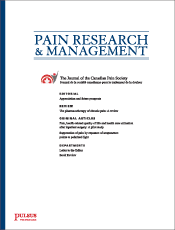
Arthroplasty
Long-acting morphine given after THR or TKR offers little pain relief
This report has been verified
by one or more authors of the
original publication.
Pain Res Manag. 2012 Mar-Apr;17(2):83-8
200 patients underwent either total hip replacement (THR) or total knee replacement (TKR). They were then randomised into two groups to either receive usual care and a long-acting oral morphine or usual care and a placebo, to measure the efficacy of additional long acting morphine in relieving postoperative pain. Following assessments over a 4 day period results indicated that the difference in pain scores between groups was statistically significant. However, these differences were not considered to be clinically significant. Furthermore, patients receiving morphine experienced more adverse effects in comparison to the control group.
Unlock the full article
Get unlimited access to OrthoEvidence with a free trial
Start TrialCritical appraisals of the latest, high-impact randomized controlled trials and systematic reviews in orthopaedics
Access to OrthoEvidence podcast content, including collaborations with the Journal of Bone and Joint Surgery, interviews with internationally recognized surgeons, and roundtable discussions on orthopaedic news and topics
Subscription to The Pulse, a twice-weekly evidence-based newsletter designed to help you make better clinical decisions
Exclusive access to original content articles, including in-house systematic reviews, and articles on health research methods and hot orthopaedic topics
Or continue reading this full article
Register Now

Subscribe to "The Pulse"
Evidence-Based Orthopaedics direct to your inbox.





































